#Dwight D. Eisenhower
Text
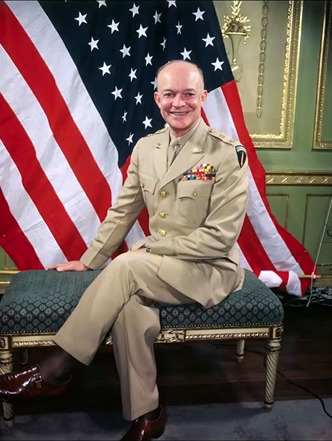

156 notes
·
View notes
Text

This political cartoon will be relevant as long as the US continues to exist.
* * * * *
“Every gun that is made, every warship launched, every rocket fired signifies in the final sense, a theft from those who hunger and are not fed, those who are cold and are not clothed. This world in arms is not spending money alone. It is spending the sweat of its laborers, the genius of its scientists, the hopes of its children. This is not a way of life at all in any true sense. Under the clouds of war, it is humanity hanging on a cross of iron.”
― Dwight D. Eisenhower
172 notes
·
View notes
Text
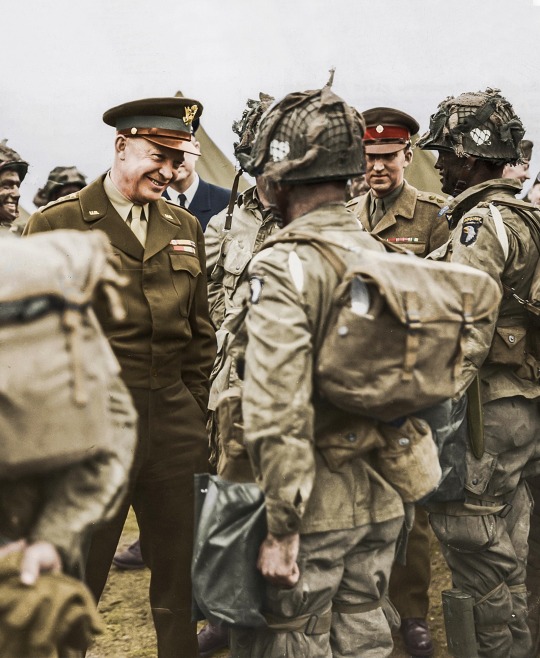
On June 5, 1944, Supreme Allied Commander, General Dwight D. Eisenhower, talks to members of the 101st Airborne just hours before they depart to jump into Nazi occupied France and spearhead Operation Overlord.
(Photo courtesy of US Army)
#dday#operation overlord#us army#101st airborne#dwight d. eisenhower#normandy#france#world war 2#wwii#military#history
215 notes
·
View notes
Text
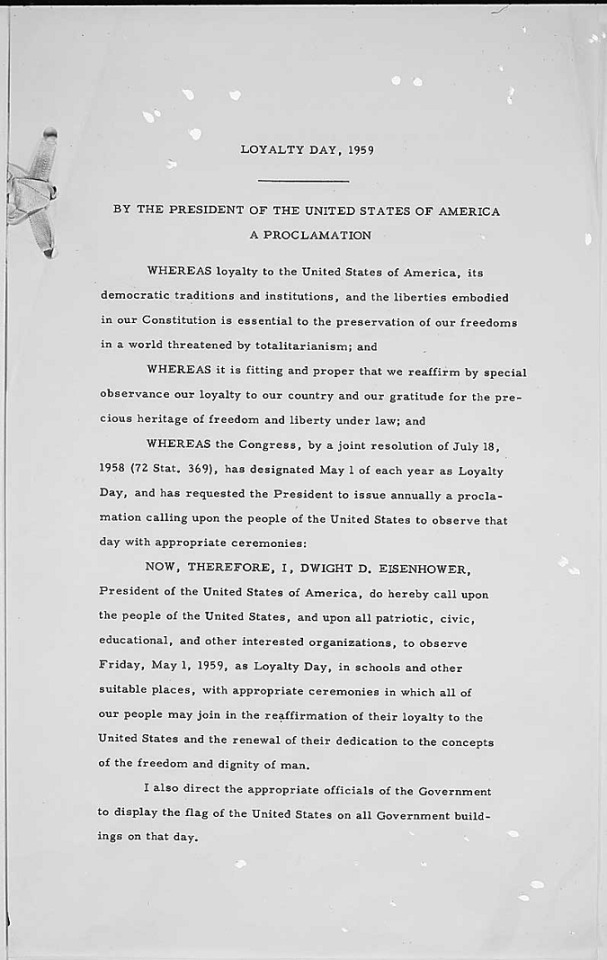

Presidential Proclamation 3282 of April 18, 1959, by President Dwight D. Eisenhower declaring May 1, 1959 Loyalty Day.
Record Group 11: General Records of the United States GovernmentSeries: Presidential Proclamations
LOYALTY DAY, 1959
BY THE PRESIDENT OF THE UNITED STATES OF AMERICA
A PROCLAMATION
WHEREAS loyalty to the United States of America, its democratic traditions and institutions, and the liberties embodied in our Constitution is essential to the preservation of our freedoms in a world threatened by totalitarianism; and
WHEREAS it is fitting and proper that we reaffirm by special observance our loyalty to our country and our gratitude for the precious heritage of freedom and liberty under law; and
WHEREAS the Congress, by a joint resolution of July 18, 1958 (72 Stat. 369), has designated May 1 of each year as Loyalty Day, and has requested the President to issue annually a proclamation calling upon the people of the United States to observe that day with appropriate ceremonies:
NOW, THEREFORE, I, DWIGHT D. EISENHOWER, President of the United States of America, do hereby call upon the people of the United States, and upon all patriotic, civic, educational, and other interested organizations, to observe Friday, May 1, 1959, as Loyalty Day, in schools and other suitable places, with appropriate ceremonies in which all of our people may join in the reaffirmation of their loyalty to the United States and the renewal of their dedication to the concepts of the freedom and dignity of man.
I also direct the appropriate officials of the Government to display the flag of the United States on all Government buildings on that day.
IN WITNESS WHEREOF, I have hereunto set my hand and caused the Seal of the United States of America to be affixed. DONE at the City of Washington this eighteenth day of April in the year of our Lord nineteen hundred and fifty-nine, and of the Independence of the United States of America the one hundred and eighty-third.
Dwight D. Eisenhower
By the President:
Robert Murphy
Acting Secretary of State
[black stamp] The National Archives and Records Service Filed and Made Available for Public Inspection APR 23 1 35 PM '59 in the Federal Register Division
3282
21 notes
·
View notes
Text
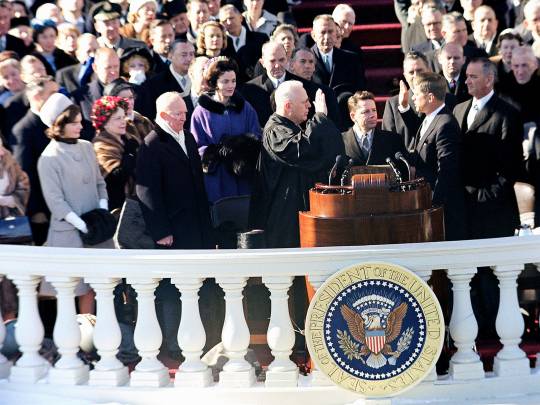
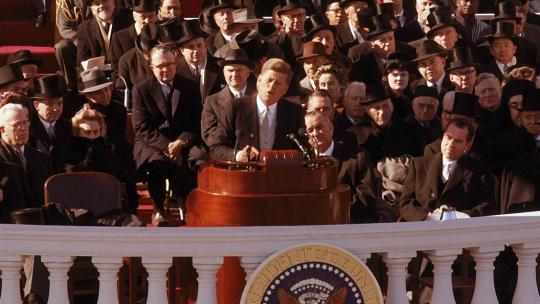
JFK's Inauguration, January 20, 1961.
#John F. Kennedy#Jacqueline Kennedy#Lyndon B. Johnson#Dwight D. Eisenhower#Richard Nixon#JFK's Inauguration
26 notes
·
View notes
Text
Ryu Number: Georgy Zhukov
Georgy Zhukov, a Marshal of the Soviet Union who oversaw some of the Red Army's most decisive victories in the course of World War II, has a Ryu Number of 3.
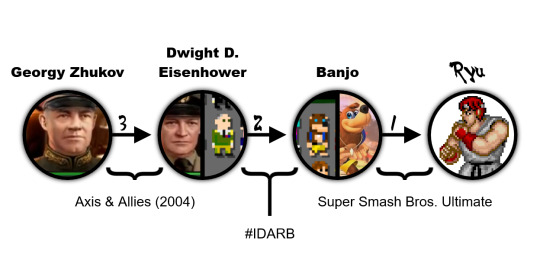
Notably, he's the only Soviet Marshal to have been played by Jason Isaacs in a satirical black comedy subsequently banned in Russia. There aren't a lot of those.
youtube
#ryu number#ryu#super smash bros. ultimate#banjo#idarb#dwight d. eisenhower#axis & allies#axis & allies (2004)#georgy zhukov#Youtube
42 notes
·
View notes
Note
Are there any notable Presidential speeches you know of that were fully written or prepared but never delivered for some reason? (Such as Nixon’s failed moon landing speech for Apollo 11)
Off the top of my head, I can't think of any specific speeches similar to the undelivered speech prepared in case of a disaster on Apollo 11 (which is still haunting to read even with the knowledge that everybody made it home safely).
Obviously, most Presidents and Presidential candidates prepare victory and concession speeches, but we don't usually see the speech that wasn't needed. Once some time had passed, Hillary Clinton did read the victory speech that she would have given had she not lost the 2016 election to Trump. It was before he was President, but General Dwight D. Eisenhower had prepared a short statement in 1944 to deliver in case the Allied landings on D-Day had failed.
It's not quite the same thing, but I have a fascinating book called Strictly Personal and Confidential: The Letters That Harry Truman Never Mailed that is a collection of letters and notes that President Truman wrote while angry or annoyed but gave into his better judgment and held back on actually mailing. They are pretty entertaining.
#Speeches#Presidential Speeches#Presidents#History#Presidency#Politics#Undelivered Speeches#Richard Nixon#President Nixon#Apollo 11#Hillary Clinton#2016 Election#Dwight D. Eisenhower#President Eisenhower#D-Day#World War II#Normandy Invasion#General Eisenhower#President Truman#Harry S. Truman#Strictly Personal and Confidential: The Letters That Harry Truman Never Mailed#Presidential Correspondence#Presidential Writing
22 notes
·
View notes
Text

Recent Acquisition - Ephemera Collection
IKE & DICK.
Political sticker.
Florence Marie Longest Scrapbook
#dwight d. eisenhower#richard nixon#president#vice president#campaign#political#politics#vintage#1950s#ephemera
9 notes
·
View notes
Text

General Dwight D. Eisenhower addressing the crowds at City Hall after the parade welcoming him home from World War II, June 19, 1945.
Photo: CBS via Getty Images
#vintage New York#1940s#World War II#Dwight D. Eisenhower#crowds#NY City Hall#City Hall#vintage NYC#NYC
29 notes
·
View notes
Text

Dwight D. Eisenhower, October 14, 1890 – March 28, 1969.
1964 photo by Richard Avedon.
15 notes
·
View notes
Text

Unhelpful jackasses en route.
#free gaza#free palestine#gaza strip#irish solidarity with palestine#palestine#gaza#news on gaza#al jazeera#boycott israel#israel#dwight d. eisenhower#USA
11 notes
·
View notes
Text

by Mr. Fish
* * * *
“Every gun that is made, every warship launched, every rocket fired signifies in the final sense, a theft from those who hunger and are not fed, those who are cold and are not clothed. This world in arms is not spending money alone. It is spending the sweat of its laborers, the genius of its scientists, the hopes of its children. This is not a way of life at all in any true sense. Under the clouds of war, it is humanity hanging on a cross of iron.”
― Dwight D. Eisenhower
29 notes
·
View notes
Text
George Clooney sounds like the name of an American president. Like there’s Gerald Ford and Bill Clinton all very presidential names. Dwight D Eisenhower however
#george clooney#usa#president of the united states#spy kids#gerald ford#bill clinton#dwight d. eisenhower
6 notes
·
View notes
Text

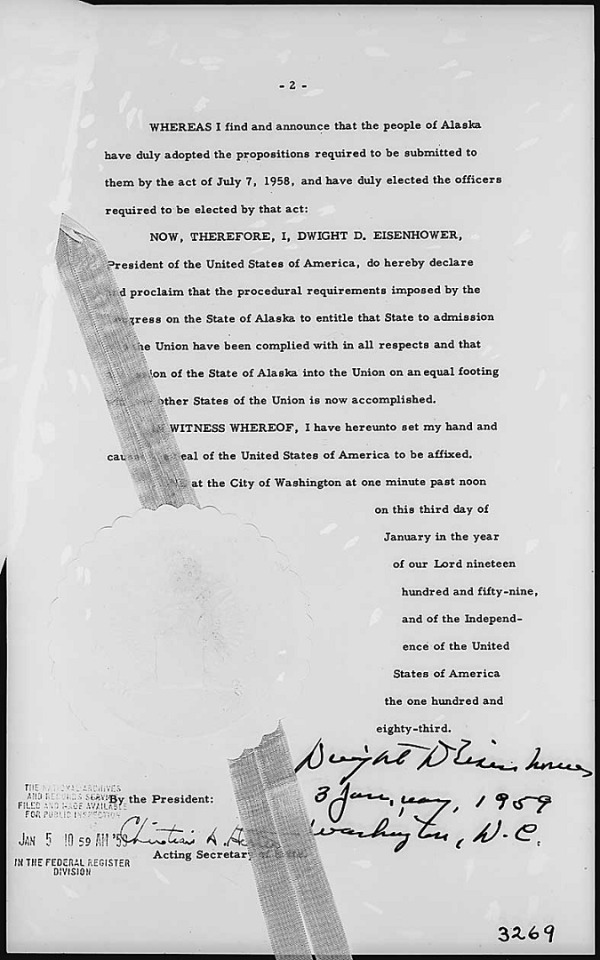
Presidential Proclamation 3269 of January 3, 1959, by President Dwight D. Eisenhower admitting the State of Alaska into the Union.
Record Group 11: General Records of the United States GovernmentSeries: Presidential Proclamations
ADMISSION OF THE STATE OF ALASKA INTO THE UNION BY THE PRESIDENT OF THE UNITED STATES OF AMERICA A PROCLAMATION WHEREAS the Congress of the United States by the act approved on July 7, 1958 (72 Stat. 339), accepted, ratified, and confirmed the constitution adopted by a vote of the people of Alaska in an election held on April 24, 1956, and provided for the admission of the State of Alaska into the Union on an equal footing with the other States of the Union upon compliance with certain procedural requirements specified in that act; and WHEREAS it appears from information before me that a majority of the legal votes cast at an election held on August 26, 1958, were in favor of each of the propositions required to be submitted to the people of Alaska by section 8 (b) of the act of July 7, 1958; and WHEREAS it further appears from information before me that a general election was held on November 25, 1958, and that the returns of the general election were made and certified as provided in the act of July 7, 1958; and WHEREAS the Acting Governor of Alaska has certified to me the results of the submission to the people of Alaska of the three propositions set forth in section 8 (b) of the act of July 7, 1958, and the results of the general election; and -2- WHEREAS I find and announce that the people of Alaska have duly adopted the propositions required to be submitted to them by the act of July 7, 1958, and have duly elected the officers required to be elected by that act: NOW, THEREFORE, I, DWIGHT D. EISENHOWER, President of the United States of America, do hereby declare and proclaim that the procedural requirements imposed by the Congress on the State of Alaska to entitle that State to admission to the Union have been complied with in all respects and that admission of the State of Alaska into the Union on an equal footing with the other States of the Union is now accomplished. IN WITNESS WHEREOF, I have hereunto set my hand and caused the Seal of the United States of America to be affixed. DONE at the City of Washington at one minute past noon on this third day of January in the year of our Lord nineteen hundred and fifty-none, and of the Independence of the United States of America the one hundred and eighty-third. By the President: Dwight D. Eisenhower 3 January, 1959 Washington, D.C.
48 notes
·
View notes
Photo

Le Capitaine Dwight D. Eisenhower ( à droite) avec trois amis (William Stuhler, le Major Sereno Elmer Brett et Paul V. Robinson) en 1919, quatre ans après avoir obtenu son diplôme de West Point
©Dwight D. Eisenhower Presidential Library and Museum
#Avant-guerre#Pre-war#Les femmes et les hommes de la guerre#Women and men of war#Personnages militaires#Figures militaires#Military figure#Personnages historiques#Historical figures#Dwight D. Eisenhower#Sereno Elmer Brett#1919
27 notes
·
View notes
Text
Ryu Number Chart Update: Call of Juarez: Gunslinger
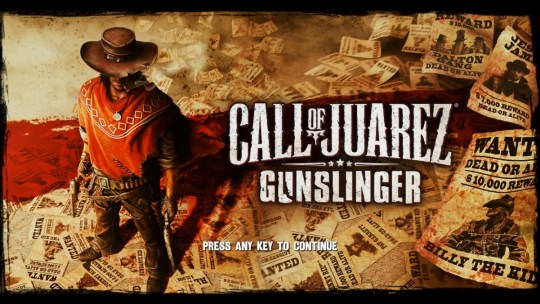
Call of Juarez: Gunslinger is the fourth game in the Call of Juarez series, all but unrelated to the first two installments and thankfully unrelated to the third (let's us not talk about the third). This game features Silas Greaves, an aging gunman and bounty hunter in 1910 Abiline, Kansas who's got some recollections to regale a handful of saloongoers about, the majority of which have to do with wandering the Wild West and putting lead in people who perhaps deserve to have a bit more lead in them. Mind, Greaves isn't exactly what you'd call a Reliable Narrator... but he's not an Unreliable Narrator, either.
Gunslinger plays with the story-in-a-story narrative in a few pretty neat ways. As the player character stalks through a brightly lit swamp, one Greaves' listeners notes that the weather must have been nice, to which Greaves responds that no, it was foggy—and the environment immediately becomes so. Paths open up for the player character to follow as Greaves mentions them. More than once, Greaves gets distracted, causing the story (i.e. gameplay) he's narrating to change, or, on one occasion, spin into worrying surreality. The best example, I think, is when one of the characters sat at the saloon says he knows how the tale goes, providing narration and scenario for the player to shoot through FPSly, only for Greaves to tell him that that's not how it went at all; this is how it went—and then you play through that.
(So yeah, this technically means that all of the stages are Greaves' recollections and tales, which means they're technically not happening during the game's narrative which is wholly set at the saloon—if they ever happened at all, is another issue—but seeing as no significant amount of gameplay occurs outside of his narrative, and at least some of the stuff Really Did Happen—including various non-Greaves bits throughout the game—I'm going to call on the Code Name: S.T.E.A.M. precedent here and count it while circumnavigating the best I can in the future around using this game for characters that only appeared in Greaves' recollections. If you have any objections, these objections are completely fair and valid and you can stop reading this post now.)
(Hey, you're still here! Aces.)
One element that differentiates Gunslinger from previous entries in the series is the number of historical Wild West figures who show up in Greaves' tales. As the game notes, it wasn't unusual for dime novels to turn real-life gunhandlers into celebrities and folkheroes, if it wasn't those slingers doing the selling themselves—and Greaves, for all the low regard he's got for those novels, is selling a heck of a story. The very first stage, in fact, involves his brief and ill-fated team-up with Billy the Kid.

And yes, all the Big Names get intro screens like this. It's awesome.

Caveat: Henry Plummer's appearance in Greaves' story is especially suspect, on account of that it places him in after 1882, about a score of years after the real-life Plummer was given an awfully tawdry corded necklace and instructed to hang around. Too anachronistic to count, then?
Maybe. I dunno if it changes anything, but (and this is completely baseless speculation, so don't you dare copy-paste me like I'm some voice of expertise) to me, it almost feels like a mistake from outside the game. A point for this hypothesis: There's a character from the saloon who's prone to interjection whenever he thinks Greaves' story has gotten a little too far off reality, and while he does pipe up during the Plummer matter, all he says is that Greaves got the location wrong, which you'd think would barely qualify as peccadillo next to the whole time thing.
But no, everyone's perfectly fine with the time thing, which suggests that it isn't an error—not within the game, at least. Ever read Umney's Last Case? It's a short story. Stephen King.
... But hey, maybe Greaves really is just making the entire Plummer business up, and that specifically is the reason it's chronologically out of whack. It's more than implied at the end of the game that Greaves has—at least at one point during the whole game—stretched some truth, somewhere, but the where and when and how much and how important go cheerily unanswered.
Also, Plummer has an appearance on-screen during a not-directly-related-to-Greaves bit where they explain who he is For The Benefit Of The Player, which means it doesn't matter whether Greaves is making anything up or not, which means this whole multiparagraph massacre was for the benefit of nothing.

I waste your time! I waste all of your time!
Anyway, Ryu Numbers:
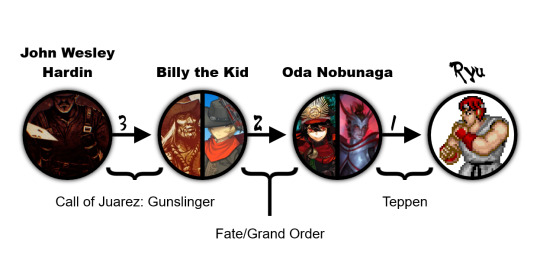
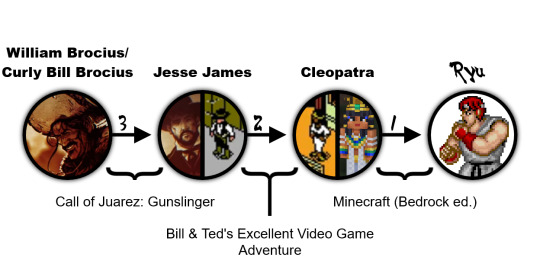
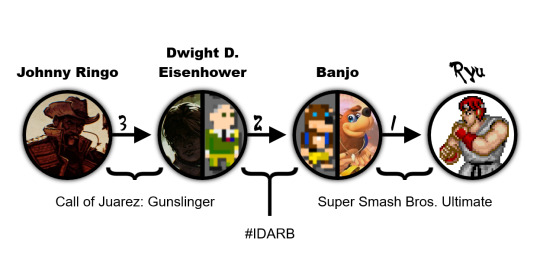
Wait, sorry, Dwight D. Eisenhower? Like the American president Dwight D. Eisenhower? Mr. I-Like-Ike?
Yeah, there's a reason the framing device bits happen in Abilene, Kansas, of all places. Eisenhower—born 1890—grew up there, before going to West Point in 1911. Before the Wild West era finally sunset, Wild Bill Hickok himself, in the early 1870's, served as marshal of the city. Tradition states that the Abilene of that time was a town of wickedness and criminality, which Hickok did his utmost to restore to lawfulness almost singlehandedly in the face of repeated attempts at assassination. And yes, there was a shootout in the Old West style, with the grievances petty but the consequences violent and lethal.
The truth, of course, is a lot more complicated (and a lot more interesting—see Robert Dykstra's 1961 paper in American Studies, "Wild Bill Hickok in Abilene"), but it wouldn't be wrong to say that Eisenhower grew up with the specter of the Old West hanging around.
... Which feels wrong, doesn't it? Talking about the Wild West and Eisenhower in anything like the same era. But the American Civil War only ended in 1865 (which means we haven't even gotten a bicentennialsworth of not-enslaving-not-imprisoned-people, incidentally), which is where a whole lot of the Wild West's big names owe their production (gotta take out that trauma somewhere). And then Manifest Destiny and genocide (all the genocide) and the Homestead Acts, and paved roads and the automobile (and in the opening cutscene, Silas Greaves' horse panics when the car nearly runs them over), and then it's World War I and an uncountable number of fresh-faced American boys are going to Europe to die face-down in the mud.
That's 1917. That's only just over fifty years.
Horse ebooks was right. Everything happens so much.
(For future reference, the characters who you can almost definitely count as showing up even if Greaves is pulling the maximum amount of bunk are Billy the Kid, Curly Bill Brocius, Johnny Ringo, Old Man Clanton, Henry Plummer—anachronism or otherwise—John Wesley Hardin, Bob Dalton, Grat Dalton, Emmett Dalton, Bill Powers—or however you'd prefer to spell him—Dick Broadwell—Bob, Grat, and those last two appear in Ben's recollection of the Dalton Gang, their bodies laid out in reference to an actual photograph that was taken—Jim Reed—that portion of Greaves' story is confirmed true—Jesse James, Frank James, Butch Cassidy, the Sundance Kid, and of course, Dwight D. Eisenhower.)
#ryu number#call of juarez: gunslinger#ryu#teppen#oda nobunaga#fate/grand order#billy the kid#john wesley hardin#minecraft#minecraft (bedrock ed.)#cleopatra#bill & ted's excellent video game adventure#jesse james#william brocius#curly bill brocius#super smash bros. ultimate#banjo#idarb#dwight d. eisenhower#johnny ringo
37 notes
·
View notes